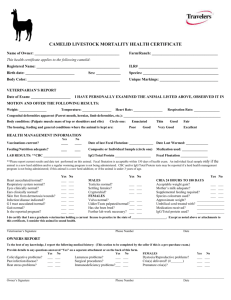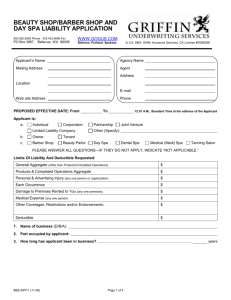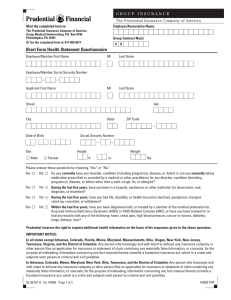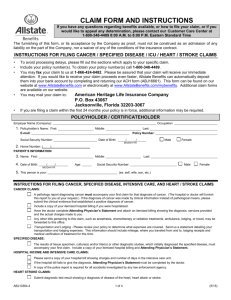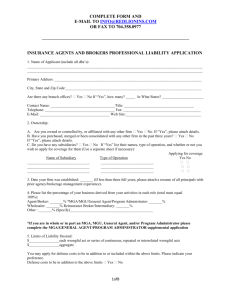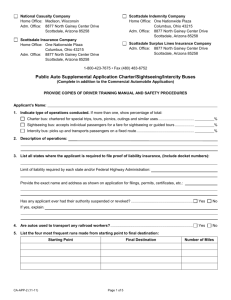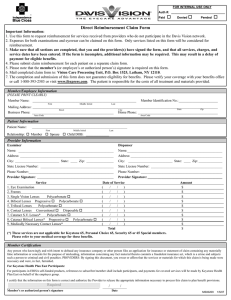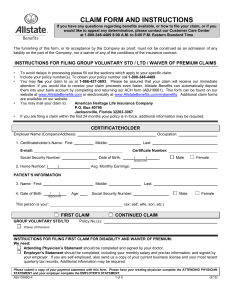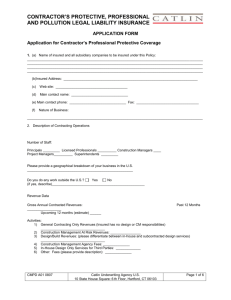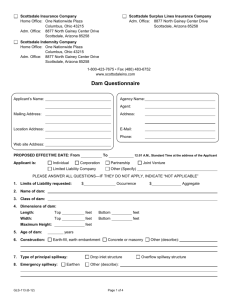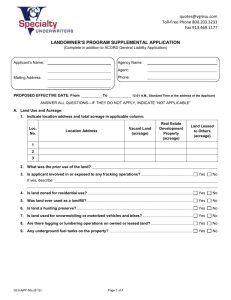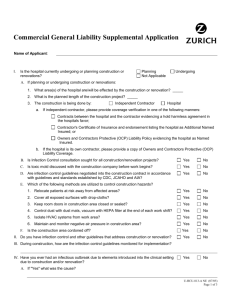Residential Facility App (GDIC) A016
advertisement
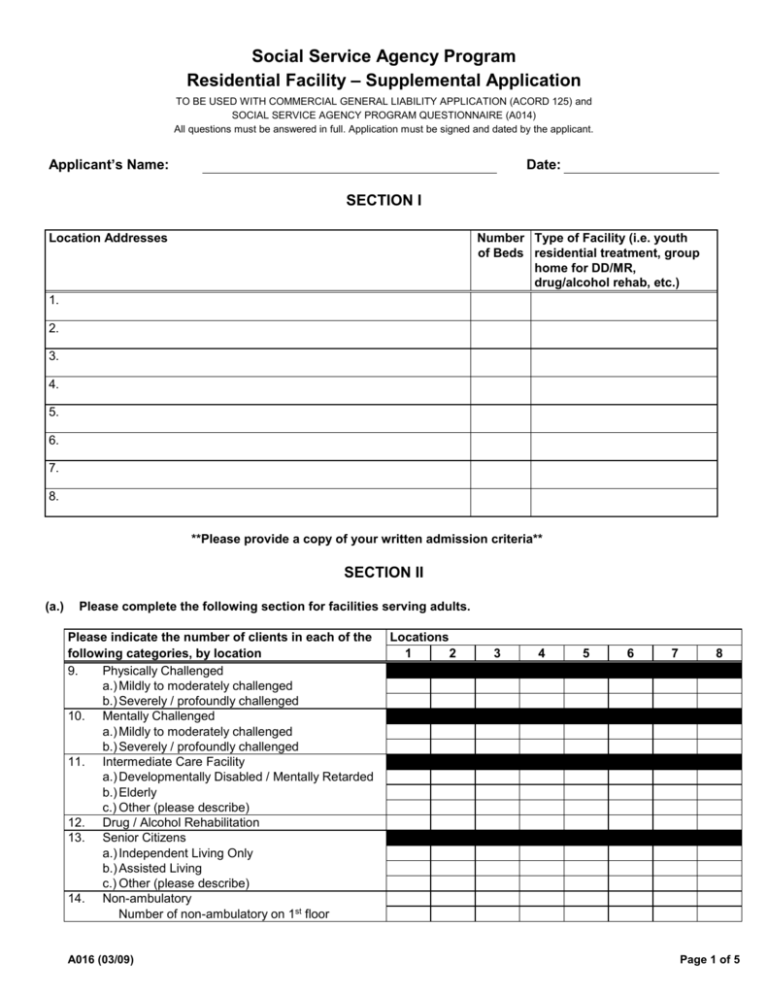
Social Service Agency Program Residential Facility – Supplemental Application TO BE USED WITH COMMERCIAL GENERAL LIABILITY APPLICATION (ACORD 125) and SOCIAL SERVICE AGENCY PROGRAM QUESTIONNAIRE (A014) All questions must be answered in full. Application must be signed and dated by the applicant. Applicant’s Name: Date: SECTION I Location Addresses Number Type of Facility (i.e. youth of Beds residential treatment, group home for DD/MR, drug/alcohol rehab, etc.) 1. 2. 3. 4. 5. 6. 7. 8. **Please provide a copy of your written admission criteria** SECTION II (a.) Please complete the following section for facilities serving adults. Please indicate the number of clients in each of the following categories, by location 9. Physically Challenged a.) Mildly to moderately challenged b.) Severely / profoundly challenged 10. Mentally Challenged a.) Mildly to moderately challenged b.) Severely / profoundly challenged 11. Intermediate Care Facility a.) Developmentally Disabled / Mentally Retarded b.) Elderly c.) Other (please describe) 12. Drug / Alcohol Rehabilitation 13. Senior Citizens a.) Independent Living Only b.) Assisted Living c.) Other (please describe) 14. Non-ambulatory Number of non-ambulatory on 1st floor A016 (03/09) Locations 1 2 3 4 5 6 7 8 Page 1 of 5 (b) Please complete the following section for facilities serving youthful clients Please indicate the number of clients in each of the following categories, by location 15. Orphans 16. Abused / Neglected 17. Juvenile Delinquent / Adjudicated 18. Psychiatric clients 19. Drug / Alcohol Rehabilitation 20. Runaways 21. Mentally Challenged a.) Mildly to moderately challenged b.) Severely to profoundly challenged 22. Physically Challenged a.) Mildly to moderately challenged b.) Severely to profoundly challenged 23. Non-ambulatory Number of non-ambulatory on 1st Floor Locations 1 2 3 4 5 6 7 8 SECTION III Questions for all facilities 24. Are secured detention services provided? If yes, indicate at which buildings/locations and number of beds: 25. 27. 28. Do you provide residential services: a.) As an alternative to incarceration? b.) For offenders being released from jail / prison? Are bed checks done? If yes, how often? Are bed checks scheduled or unscheduled? Is more than one staff member on duty at all times? How is staff-to-client contact monitored? 29. How is overnight staff monitored? 30. Are security cameras used to monitor operations? 26. Yes No Yes Yes Yes No No No Yes No Yes No SECTION IV Physical characteristics of buildings at each location: Locations 1 2 31. Year built/age 32. Number of stories 33. Automatic fire sprinklers (Yes or No) A016 (03/09) 3 4 5 6 7 8 Page 2 of 5 Physical characteristics of buildings at each location: Locations 1 2 34. What % of building has fire sprinklers? 35. Is smoking permitted in sleeping room? (Yes or No) If yes, do you have smoke/heat detectors in sleeping rooms? (Yes or No) Smoke/heat detectors in hallways and commons area? (Yes or No) If yes, are detectors wired to a central (reporting) station? (Yes or No) If over 3 stories, are there fire doors on each landing? (Yes or No) If no, please explain: 36. 37. 38. If yes, are these doors equipped with self-closing devices? (Yes or No) If building is over 30 years old, has the electrical system been updated? (Yes or No) When? 39. Number of fire escapes (total) 40. Number of exits (total) 41. Do you have a written emergency evacuation plan? (Yes or No) Are emergency procedures and floor plan posted? (Yes or No) Have you established a central meeting place outside the building? (Yes or No) How often do you have evacuation drills? 42. Is building inspected by Fire Department or another outside inspection company? (Yes or No) 3 4 5 6 7 8 This application shall not be binding unless and until confirmation by the Company or its duly appointed representatives has been given, and that a policy shall be issued and a payment shall be made, and then only as of the commencement date of said policy and in accordance with all terms thereof. The said applicant hereby covenants and agrees that the foregoing statements and answers are a full and true statement of all the facts and circumstances with regard to the risk to be insured , and the same are hereby made the basis and conditions of the insurance and a warranty on the part of the Insured. IMPORTANT NOTICE As part of our underwriting procedure, a routine inquiry may be made to obtain applicable information concerning character, general reputation, personal characteristics, and mode of living. Upon written request, additional information as to the nature and scope of the report, if one is made, will be provided. FRAUD STATEMENT To Insureds in the States of: Alabama, Alaska, Arizona, California, Connecticut, Delaware, Georgia, Hawaii, Idaho, Illinois, Indiana, Iowa, Kansas, Maine, Massachusetts, Maryland, Michigan, Minnesota, Mississippi, Missouri, Montana, Nebraska, New Hampshire, Nevada, North Carolina, North Dakota, Oregon, South Carolina, South Dakota, Tennessee, Texas, Utah, Vermont, West Virginia, Wisconsin, Wyoming: A016 (03/09) Page 3 of 5 NOTICE: In some states, any person who knowingly, and with the intent to defraud any insurance company or other person, files an application for insurance or statement of claim containing any materially false information, or, for the purpose of misleading, conceals information concerning any fact material thereto, may commit a fraudulent insurance act which is a crime in many states. Penalties may include imprisonment, fines, or a denial of insurance benefits. Arkansas Any person who knowingly presents a false or fraudulent claim for payment of a loss or benefit or knowingly presents false information in an application for insurance is guilty of a crime and may be subject to fines and confinement in prison. Colorado It is unlawful to knowingly provide false, incomplete or misleading facts or information to an insurance company for the purpose of defrauding or attempting to defraud the company. Penalties may include imprisonment, fines, denial of insurance and civil damages. Any insurance company or agent of an insurance company who knowingly provides false, incomplete, or misleading facts or information to a policyholder or claimant for the purpose of defrauding or attempting to defraud the policyholder or claiming with regard to a settlement or award payable for insurance proceeds shall be reported to the Colorado Division of Insurance within the Department of Regulatory Agencies. District of Columbia WARNING: It is a crime to provide false or misleading information to an insurer for the purpose of defrauding the insurer or any other person. Penalties include imprisonment and/or fines. In addition, an insurer may deny insurance benefits if false information materially related to a claim was provided by the applicant. Florida Any person who knowingly and with intent to injure, defraud or deceive any insurance company files a statement of claim containing any false, incomplete, or misleading information is guilty of a felony of the third degree. Kentucky Any person who knowingly and with intent to defraud any insurance company or other person files an application for insurance containing any materially false information or conceals, for the purpose of misleading, information concerning any fact material thereto commits a fraudulent insurance act, which is a crime. Louisiana Any person who knowingly presents a false or fraudulent claim for payment of a loss or benefit or knowingly presents false information in an application for insurance is guilty of a crime and may be subject to fines and confinement in prison. New Jersey Any person who includes any false or misleading information on an application for an insurance policy is subject to criminal and civil penalties New Mexico Any person who knowingly presents a false or fraudulent claim for payment of a loss or benefit or knowingly presents false information in an application for insurance is guilty of a crime and may be subject to civil fines and criminal penalties. New York Any person who knowingly and with intent to defraud any insurance company or other person files an application for commercial insurance or a statement of claim for any commercial or personal insurance benefits containing any materially false information, or conceals for the purpose of misleading, information concerning any fact material thereto, and any person who, in connection with such application or claim, knowingly makes or knowingly assists, abets, solicits or conspires with another to make a false report of the theft, destruction, damage or conversion of any motor vehicle to a law enforcement agency, the department of motor vehicles or an insurance company commits a fraudulent insurance act, which is a crime, and shall also be subject to a civil penalty not to exceed five thousand dollars and the value of the subject motor vehicle or stated claim for each violation. A016 (03/09) Page 4 of 5 Ohio Any person who, with intent to defraud or knowing that he/she is facilitating a fraud against an insurer, submits an application or files a claim containing a false or deceptive statement is guilty of insurance fraud. Oklahoma WARNING: Any person who knowingly, and with intent to injure, defraud or deceive any insurer, makes any claim for the proceeds of an insurance policy containing any false, incomplete or misleading information is guilty of a felony. Pennsylvania Any person who knowingly and with intent to defraud any insurance company, or other person, files an application for insurance or statement of claim containing any materially false information or conceals for the purpose of misleading, information concerning any fact material thereto, commits a fraudulent act, which is a crime, and subjects such person to criminal and civil penalties. Rhode Island NOTICE: Under Rhode Island law, there is a criminal penalty for failure to disclose a conviction of arson. In some states, any person who knowingly, and with intent to defraud any insurance company or other person, files an application for insurance or statement of claim containing any materially false information, or, for the purpose of misleading, conceals information concerning any fact material thereto, may commit a fraudulent insurance act, which is a crime in many states. Virginia It is a crime to knowingly provide false, incomplete or misleading information to an insurance company for the purpose of defrauding the company. Penalties include imprisonment, fines and denial of insurance benefits. Washington It is a crime to knowingly provide false, incomplete, or misleading information to an insurance company for the purposes of defrauding the company. Penalties include imprisonment, fines, and denial of insurance benefits. Producer’s Signature A016 (03/09) Date Applicant's Signature Date Page 5 of 5
